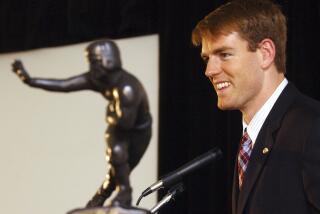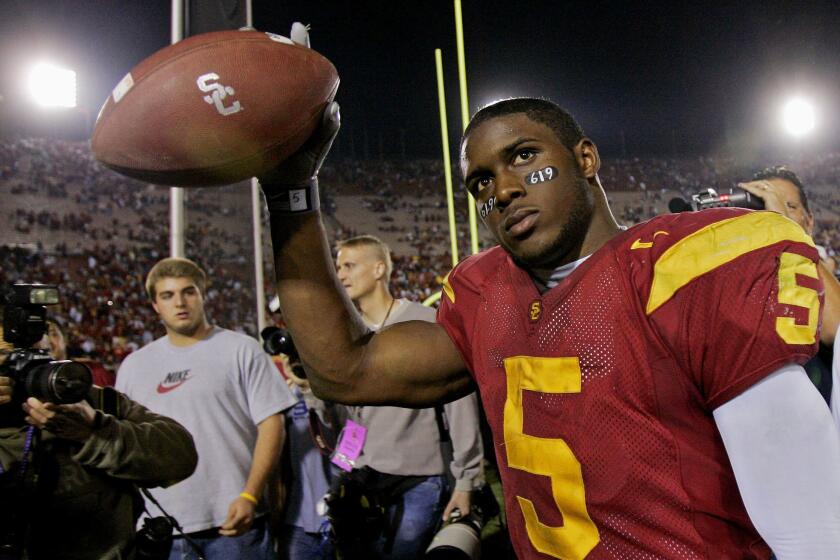Rachel Alexandra shows that girls rule on this day
The big headline in Saturday’s Baltimore Sun missed by only a word. It read: The Lady and the Champ. Had they made the third word “is,” they’d have nailed it.
Rachel Alexandra won the Preakness on Saturday, the fifth filly in 134 years to do so. The last time a filly won this second leg of horse racing’s Triple Crown was 1924. That was four years after women were given the right to vote in America.
Women’s pride has had its good days, and this was certainly one of them.
This is a story almost too good to be true. Horse racing could hire the best of Madison Avenue and not create this kind of compelling tale.
That Rachel Alexandra actually went off as a 9-5 favorite was startling enough. Even though her 20 1/4 -length victory in the May 1 Kentucky Oaks was stunning and impossible to ignore, it was against other fillies and this was against the boys, who tend to ride rough and expose equine feminine frailty. At least that’s the doctrine around the barns and along the backstretch.
Around rickety old Pimlico, which hosted Saturday’s race, there were lots of knowing nods and winks from male experts, as they stood in line at the betting windows.
Still, the betting public, which included lots of females on this day, kept her the favorite and certainly watched in satisfaction and awe as she took the lead halfway home, expanded it down the homestretch, and kept digging as late-closing Kentucky Derby winner Mine That Bird made another run, falling a length short this time.
Aboard Rachel Alexandra was Calvin Borel, who made this an even bigger story by turning in a masterful ride aboard Mine That Bird in the Derby two weeks ago and then opting to ride Rachel Alexandra in the Preakness. He was the first jockey to do that, and now he is the first jockey to win the first two legs of a Triple Crown on different horses.
“This is the best horse I’ve ever ridden,” Borel said, shrugging off suggestions that his victory was vindication for his decision. “I’m paid to win. This was the best horse.”
If Rachel Alexandra and Borel were the main stories, Jess Jackson wasn’t far behind.
Ten days ago, somebody else owned the horse. Then Jackson, the billionaire founder of Kendall-Jackson winery and a 79-year-old man with the zeal of a 30-something for the concept of risk and reward, saw the Oaks on television and sent his bloodstock agent, John Moynihan, off to do a deal. Moynihan, who did the same thing in 2007 when Jackson acquired a major share of two-time horse of the year Curlin, did it again.
Ten days ago, Rachel Alexandra was a super filly whose owners had no intention of running her against the boys, so much so that they had passed on the early $600 Triple Crown nomination fee. Overnight, she belonged to Jackson and partner Hal McCormick and was in the Preakness discussion.
Once trainer Steve Asmussen got Rachel Alexandra from the barn of previous trainer Hal Wiggins, and once she got a long look from equine doctors, the Preakness was a go.
“She got a more thorough physical than I do,” Jackson said.
For Jackson, born in Los Angeles and raised in Northern California, these moments have a holy war feel.
An hour before the race, he sat in the infield, talked about how happy he was that this story had created a buzz for racing, and called the upcoming Preakness “a defining moment” for Rachel Alexandra.
“People don’t believe she can do it against the boys,” he said. “But it’s not about gender. It’s about the best athlete.”
Then he told the story about how he started to get hooked on horse racing.
“I was 9 and my uncle took me to see Seabiscuit,” he said. “It was at Bay Meadows. He was the head disciplinarian for the San Francisco school system, but he was only 5-foot-2. It was crowded, and he couldn’t see, so he put me up on his shoulders and I did a play-by-play for him.”
At race time, Jackson, who can be as unassuming as he is powerful, walked to the grandstand, stood between his son, Chris, and a track worker named Denise Hudgins, dressed in her red uniform.
While one of the most expensive and talked-about horses in history stumbled a bit out of the gate, righted herself and quickly got from the 13th starting spot to second along the rail and off the shoulder of Big Drama, then scared her connections by taking an earlier-than-wished-for lead on the backstretch, Jackson and Hudgins exchanged pleasantries.
Eventually, Borel broke Rachel Alexandra loose at the top of the stretch and kept her going, despite the charge by Mike Smith and Mine That Bird.
“When I got to the top of the stretch,” Borel said, “I knew we would win.”
He said so, even while saying that Rachel Alexandra had some trouble grabbing the moist dirt track and saying he hadn’t given her the ideal trip he had envisioned.
Still, the late run of Mine That Bird, who was the “Champ” in the newspaper headline, provides enough fodder for chatter about the Belmont, the third leg of the Triple Crown on June 6. Jackson and Asmussen said that “the horse will tell us” whether she will be ready for a try at the 1 1/2 -mile Belmont. Mine That Bird’s connections probably will use the same process for their Belmont decision.
Hours after her historic victory, Rachel Alexandra was back in the hands of main handler, assistant trainer Scott Blasi, whom Asmussen credited with much of this Preakness success.
Blasi is married to Helen Pitts, who trained Einstein for his victory last March in the Santa Anita Handicap. She was the first female trainer to win that prestigious race.
Could it be that horse racing, one of the last strongholds of entrenched testosterone, is starting to show a feminine side?
--
More to Read
Get our high school sports newsletter
Prep Rally is devoted to the SoCal high school sports experience, bringing you scores, stories and a behind-the-scenes look at what makes prep sports so popular.
You may occasionally receive promotional content from the Los Angeles Times.







